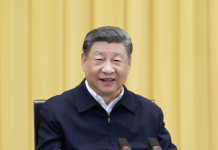Hechi: Four years ago, when Xie Wanju, a military veteran, was selected to head the poverty alleviation work in Zhadong, a mountainous village in Hechi, Guangxi Zhuang Autonomous Region in south China, he was reluctant. The job came with a lot of pressure and would leave him little time for his family. Though he finally accepted his new position—First Secretary of the Communist Party of China Zhadong Village Branch—all he wanted was the two-year term to come to an end as soon as possible, even before he had gone there.
But when he finally reached the village, the abject poverty he saw there jerked him out of his reluctance. “There was only a small path in the mountains and it took me four hours to reach my first household,” Xie told Beijing Review. “I had to clamber up using my hands as well. The house was dilapidated, like the other houses in the village, and couldn’t keep the rain and wind out. In their cooking pot there was nothing but corn and wild roots.”
It was hard to believe that such dire poverty existed only 20 km from the flourishing district of Yizhou, where he lived. “I must do something here,” he thought.
So he threw himself into his new assignment with fervor. His first strategy was to develop new agricultural industries with local characteristics and get roads built to connect the village to the outside world.
China’s vast rural areas have long been plagued by poverty. As part of the drive to eradicate poverty by the end of 2020, over 200,000 first secretaries like Xie have been chosen based on their outstanding performance in other jobs, and sent to impoverished villages nationwide to implement targeted poverty alleviation measures suiting individual villages.
Finding a way out of poverty for Zhadong was a huge challenge. Xie explored the village and found it had limited arable land and the soil was of poor quality. Villagers grew some rice, corn and soybean but the crops didn’t bring them much money. So he decided he would ask them to plant cash crops instead. After calculations, he picked on the passion fruit, as it can survive poor soil and grows fast.
To his surprise, the villagers rejected his proposal. They didn’t think passion fruit, something they had never even heard of before, would lead them to prosperity. They put their trust in the traditional crops grown in the village for generations. Worse still, he found some villagers were resigned to their poverty.
“At that moment, I realized that the core of poverty alleviation is to persuade people to take action; to awaken their desire to end poverty, instead of trying to make them do something against their will,” he said.
That was the toughest challenge. To persuade them, Xie and the villagers’ committee staff decided to lead by example. They planted passion fruit saplings in a garden and when the fruit ripened, sold them successfully. Seeing that the fruit sold at a good price, some villagers were then swayed into following suit. Together with Xie, they planted saplings in the land owned by the village collective. After the fruit brought them money, the more adventurous villagers began to plant the saplings in their own plots. At the end of 2019, the village was growing the fruit on almost 20 hectares and some of the villagers had managed to get rid of poverty.
– The Daily Mail-Beijing Review News exchange item
Home CHINA-CPEC-BRI Military vet picked for spearheading poverty alleviation fulfills a village’s dreams






